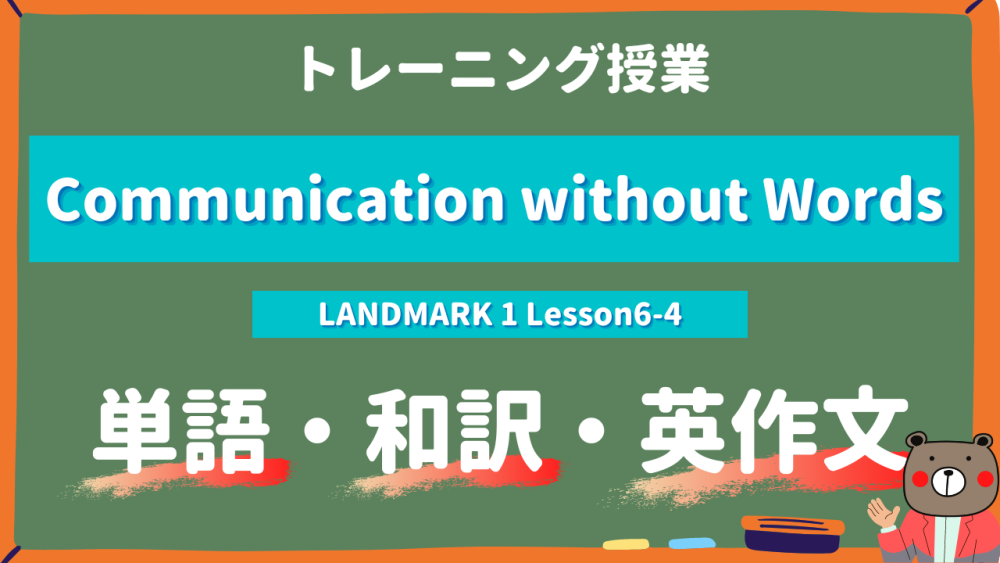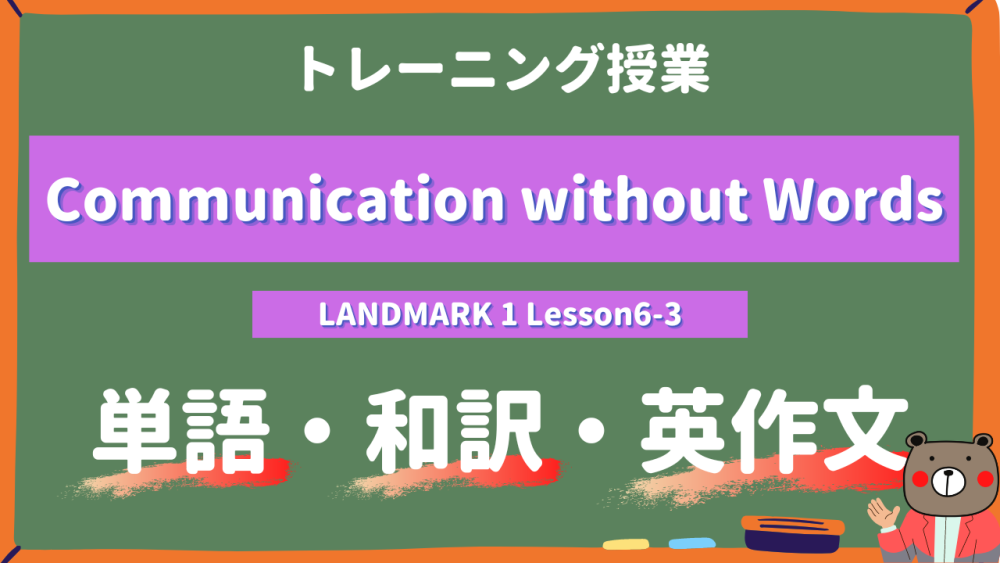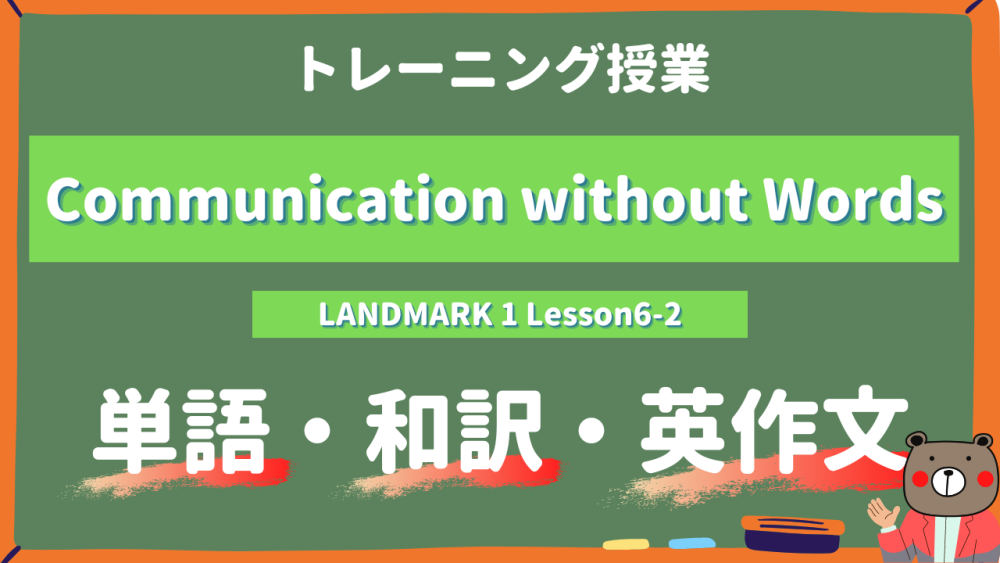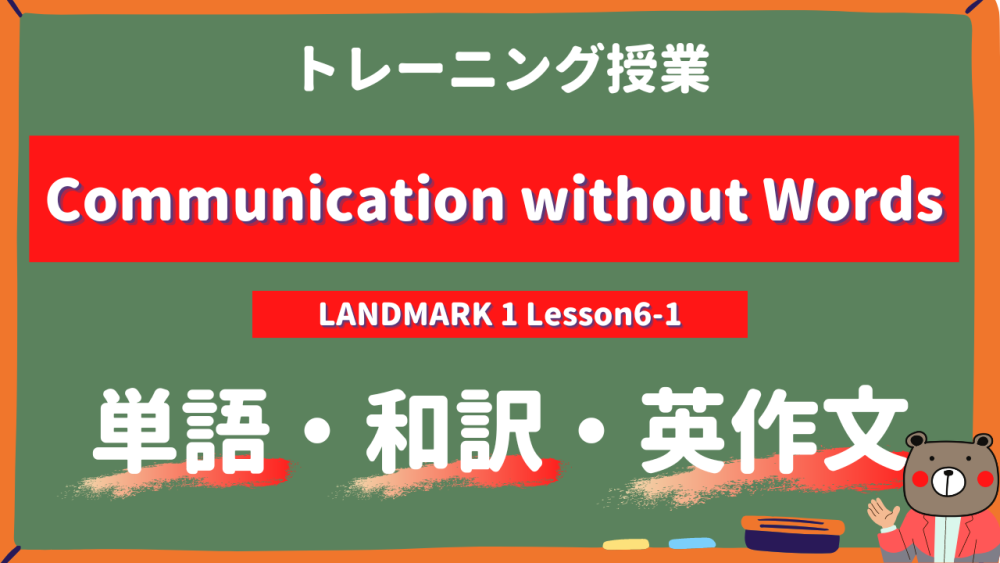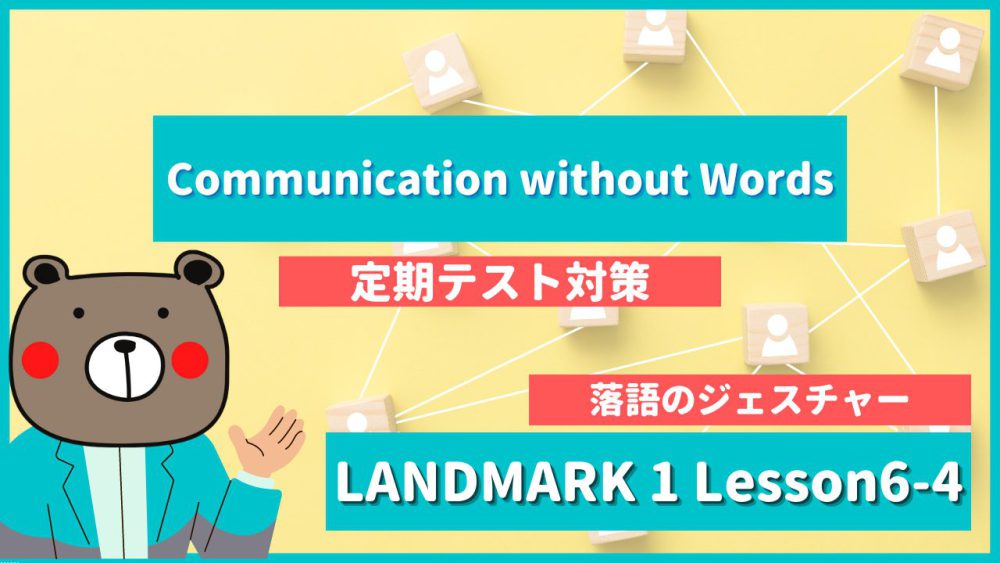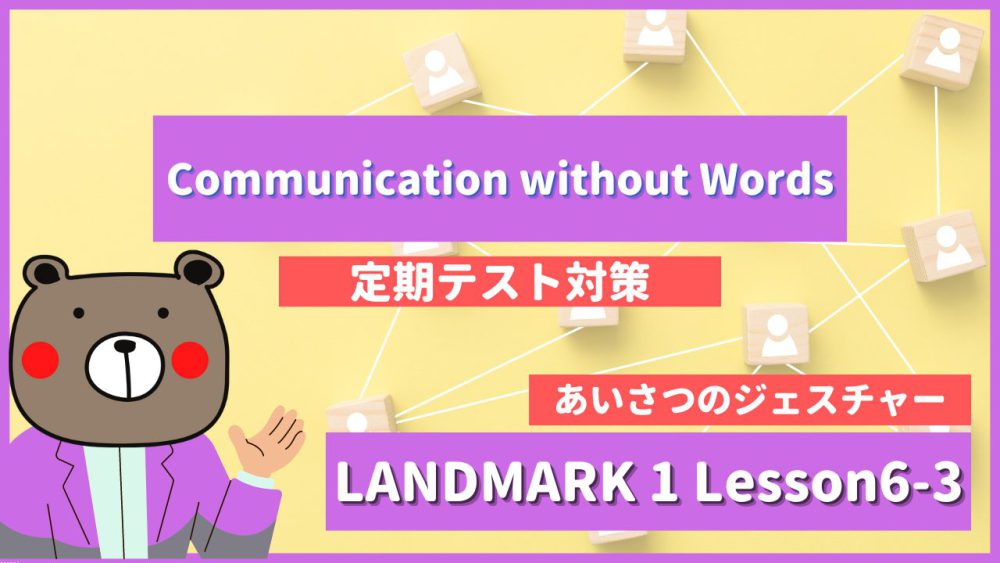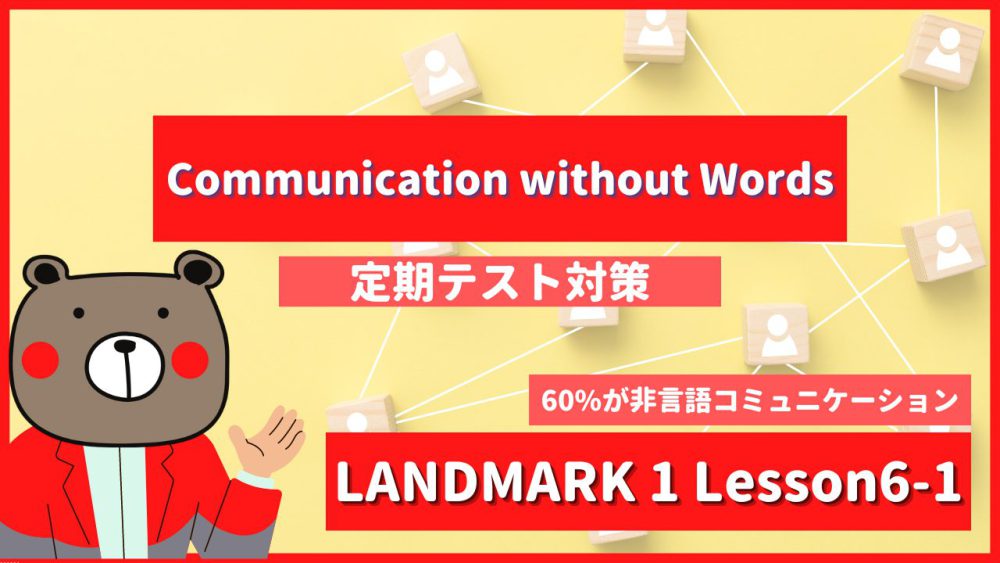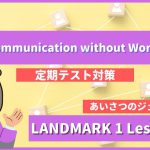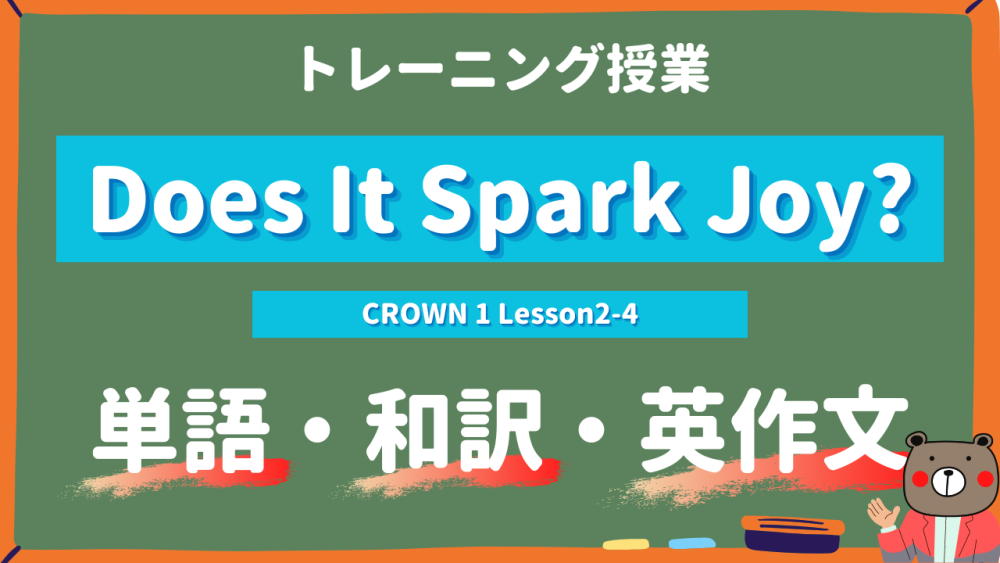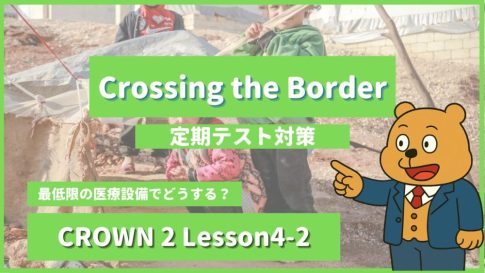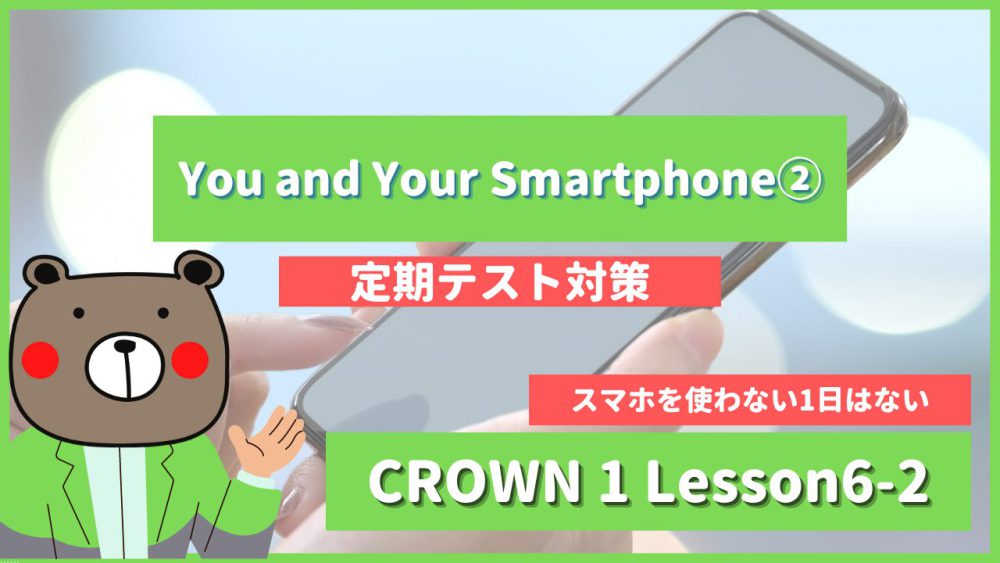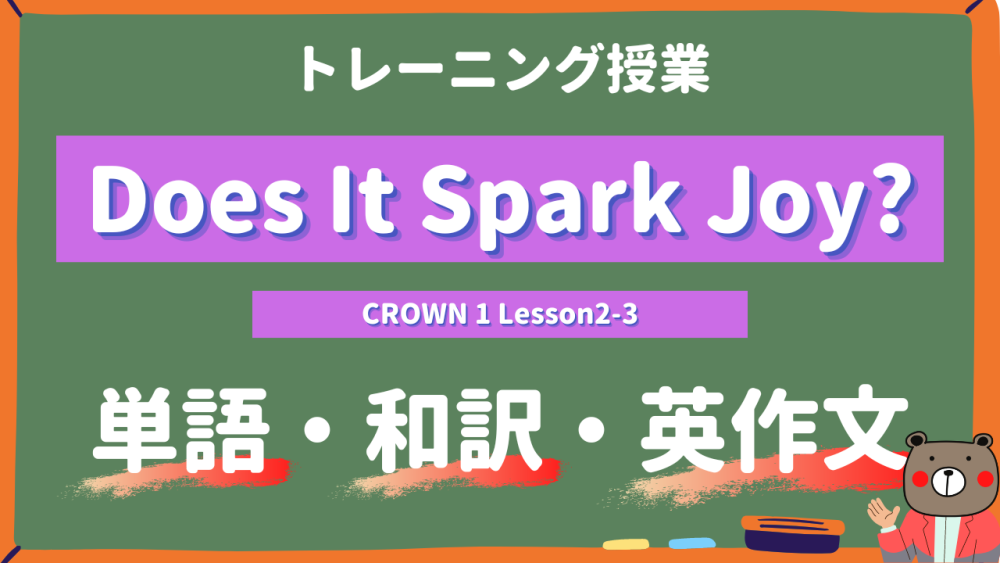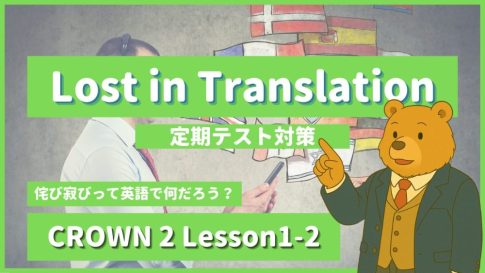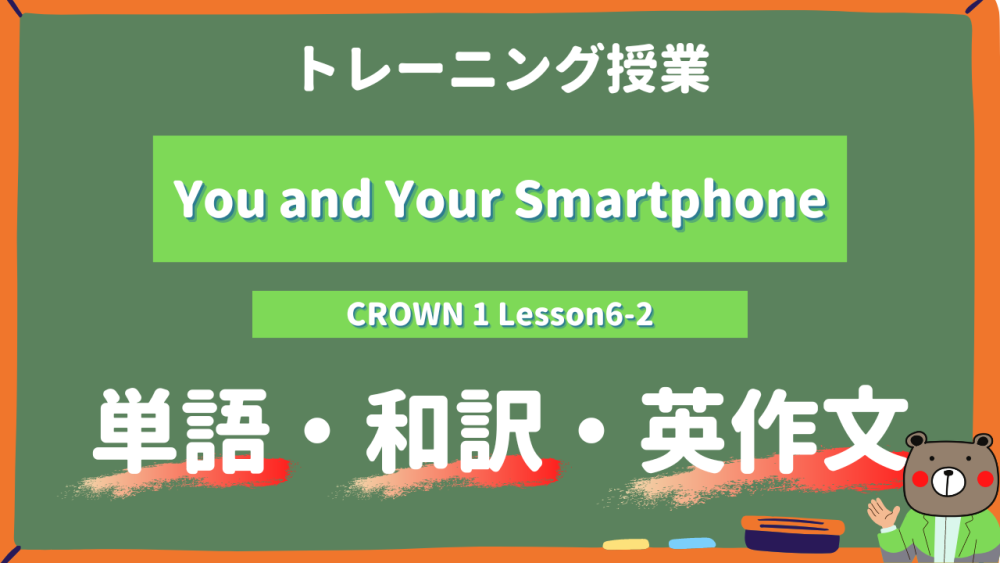▼音声で学びたい方はこちらへ🐻
現在撮影中❗️

▼LANDMARK1-高1《Lesson6》はこちらから🐻
- 授業前にひとこと
- 勉強のポイント
- 本文&和訳
- 重要単語
- 重要ポイント
- 【1】What can shaking one’s head mean in Bulgaria?
- 【2】Do people look directly at their elders in South Korea?
- 【3】Non-verbal communication can differ in meaning from place to place.
- 【4】That is why the gestures of people from other countries are easy to misunderstand.
- 【5】For example, shaking one’s head means “no” in Britain as well as in Japan, but it can show the opposite meaning in Bulgaria.
- 【6】If you hold your palms open when you talk, most Americans think you are open-minded and honest.
- 【7】On the other hand, the same action can give Greek people a negative impression because it is considered an insult.
- 【8】Even universal body language, such as smiling and eye contact, can differ in meaning from country to country.
- 【9】Smiling usually expresses happiness or friendliness.
- 【10】However, in Japan, for example, it can be a sign of discomfort or embarrassment.
- 【11】In the US, people look directly at each other when they speak.
- 【12】It shows interest and honesty.
- 【13】Similarly, people in Lebanon stand close together and look into each other’s eyes.
- 【14】It also shows honesty and helps the listener understand the speaker’s feelings.
- 【15】However, people in South Korea avoid making long eye contact with their elders.
- 【16】It is more polite to look away from them often during a conversation.
授業前にひとこと


今回は、LANDMARK1-高1《Lesson6》について扱っていきます❗️
Lesson6のタイトルは…🐻
Communication without Words
という「言葉を使わないコミュニケーション」についてのお話です。
ちなみに、このLessonでは…
冒頭の Question を踏まえて文章を読む
のを意識してください❗️
さて、いつも授業前に説明することですが…
⇧に載せてあります『単語・和訳・英作文トレーニング』をテスト1週間前から毎日やってみてください❗️曖昧な理解がなくなり、成績が爆伸びします!!
コミュ英以外の定期テスト対策は?
現代文の定期テスト対策は こちら から
古文の定期テスト対策は こちら から
漢文の定期テスト対策は こちら から
teite channel をもっと活用する


▷ 解説記事のリクエスト
▷ 新着情報のキャッチ
▷ 定期テスト予想問題
▷ オリジナルグッズの購入
ができるようになっています🐻
teite channel の 公式LINEアカウント はこちら
勉強のポイント
①本文は、非言語コミュニケーションは国ごと、場所ごとに意味が変わることを伝えているのを理解する。
②単語・重要ポイントをインプットする。
③冒頭の Question を踏まえて文章を読む。
本文&和訳
Question3
What can shaking one’s head mean in Bulgaria?
首を振るのはブルガリアでは何を意味することがありますか?
Question4
Do people look directly at their elders in South Korea?
韓国では人々は年上の目を真っ直ぐ見ることをしますか?
本文(Part2)
【3】Non-verbal communication can differ in meaning from place to place.
非言語コミュニケーションはあちらこちらで、意味が異なることがあります。
That is why the gestures of people from other countries are easy to misunderstand.
だから、他の国の人々のジェスチャーは誤解されやすいです。
For example, shaking one’s head means “no” in Britain as well as in Japan, but it can show the opposite meaning in Bulgaria.
例えば、首を振るのは日本だけでなくイギリスでも「いいえ」を意味しますが、それはブルガリアでは反対の意味を指すことがあります。
If you hold your palms open when you talk, most Americans think you are open-minded and honest.
もしあなたが話をするときに手のひらをずっと開いているなら、ほとんどのアメリカ人はあなたを心が広く、正直な人だと思います。
On the other hand, the same action can give Greek people a negative impression because it is considered an insult.
一方で、同じ動作がギリシャ人に否定的な印象を与えることがあります、なぜならそれは無礼だと考えられているからです。
【4】Even universal body language, such as smiling and eye contact, can differ in meaning from country to country.
笑顔や目と目を合わせるアイコンタクトのような、一般的なボディランゲージさえ国によって意味が異なることがあります。
Smiling usually expresses happiness or friendliness.
笑顔はたいてい幸せや友好的であることを表現します。
However, in Japan, for example, it can be a sign of discomfort or embarrassment.
しかし、例えば日本では、それは不快感や恥ずかしさの仕草になることもあります。
In the US, people look directly at each other when they speak.
アメリカでは、人々は話をする時に、お互いに目を真っ直ぐ見ます。
It shows interest and honesty.
それは興味や正直さを表します。
Similarly, people in Lebanon stand close together and look into each other’s eyes.
同様に、レバノンの人々は一緒に近くに立ち、お互いの目を見つめます。
It also shows honesty and helps the listener understand the speaker’s feelings.
それもまた正直さを表し、聞き手が話し手の感情を理解する手助けにもなります。
However, people in South Korea avoid making long eye contact with their elders.
しかし、韓国の人々は年上の人とと長い時間目と目を合わせるのを避けます。
It is more polite to look away from them often during a conversation.
会話の間にしばしば彼らから目を離す方が、より礼儀正しいのです。
重要単語


V : 動詞 , Ving : 動名詞 , Vpp : 過去分詞, O:目的語, C:補語
| misunderstand | 誤解をする |
| Britain | イギリス〈国名〉 |
| opposite | 反対の |
| Bulgaria | ブルガリア〈国名〉 |
| palm | 手のひら |
| open-minded | 心の広い、開放的な |
| honest | 正直な |
| Greek | ギリシャの |
| negative | 否定的な |
| impression | 印象 |
| insult | 無礼 |
| universal | 一般的な |
| shake one’s head | 首を振る |
| on the other hand | 一方で |
| friendliness | 友好、友好的であること |
| discomfort | 不快、不快感 |
| embarrassment | 恥じらい、恥ずかしいこと |
| directly | 真っ直ぐ |
| honesty | 正直、誠実 |
| Lebanon | レバノン |
| listener | 聞き手 |
| speaker | 話し手 |
| elder | 年上 |
| polite | 礼儀正しい |
| avoid Ving | Vすることを避ける |
重要ポイント
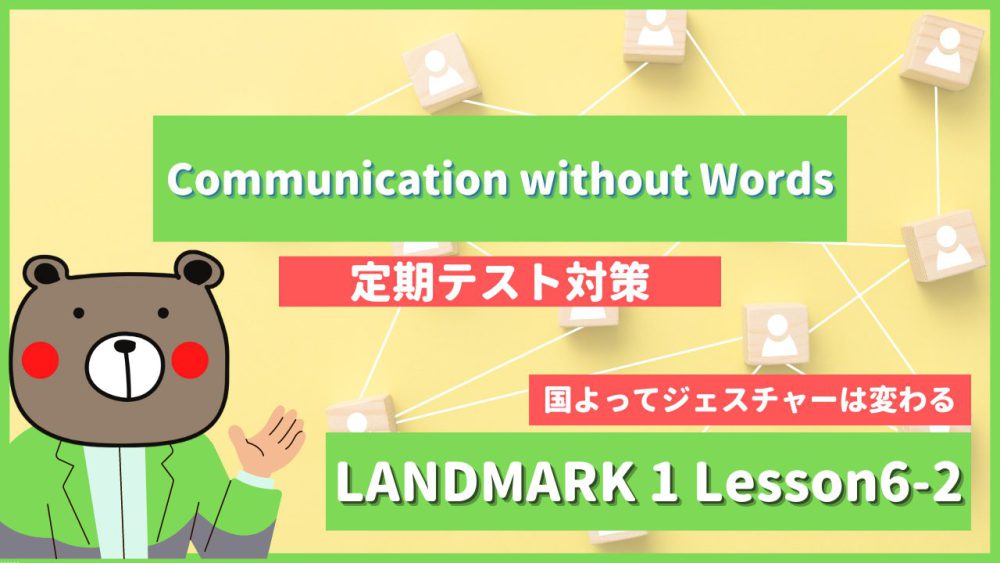

「ピンク」=重要ポイント
▼記号について
V : 動詞 Ving : 動名詞 Vpp : 過去分詞
【 】名詞句・節 〈 〉形容詞句・節 ( )副詞句・節
S:主語 O:目的語 C:補語 M:副詞
【1】What can shaking one’s head mean in Bulgaria?
《和訳》
首を振るのはブルガリアでは何を意味することがありますか?
《重要ポイント》
ここまで執筆完了❗️日々解説を加えていきます!


teite channel の 公式LINEアカウント はこちら
【2】Do people look directly at their elders in South Korea?
《和訳》
韓国では人々は年上の目を真っ直ぐ見ることをしますか?
《重要ポイント》
【3】Non-verbal communication can differ in meaning from place to place.
《和訳》
非言語コミュニケーションはあちらこちらで、意味が異なることがあります。
《重要ポイント》
【4】That is why the gestures of people from other countries are easy to misunderstand.
《和訳》
だから、他の国の人々のジェスチャーは誤解されやすいです。
《重要ポイント》
【5】For example, shaking one’s head means “no” in Britain as well as in Japan, but it can show the opposite meaning in Bulgaria.
《和訳》
例えば、首を振るのは日本だけでなくイギリスでも「いいえ」を意味しますが、それはブルガリアでは反対の意味を指すことがあります。
《重要ポイント》
【6】If you hold your palms open when you talk, most Americans think you are open-minded and honest.
《和訳》
もしあなたが話をするときに手のひらをずっと開いているなら、ほとんどのアメリカ人はあなたを心が広く、正直な人だと思います。
《重要ポイント》
【7】On the other hand, the same action can give Greek people a negative impression because it is considered an insult.
《和訳》
一方で、同じ動作がギリシャ人に否定的な印象を与えることがあります、なぜならそれは無礼だと考えられているからです。
《重要ポイント》
【8】Even universal body language, such as smiling and eye contact, can differ in meaning from country to country.
《和訳》
笑顔や目と目を合わせるアイコンタクトのような、一般的なボディランゲージさえ国によって意味が異なることがあります。
《重要ポイント》
【9】Smiling usually expresses happiness or friendliness.
《和訳》
笑顔はたいてい幸せや友好的であることを表現します。
《重要ポイント》
【10】However, in Japan, for example, it can be a sign of discomfort or embarrassment.
《和訳》
しかし、例えば日本では、それは不快感や恥ずかしさの仕草になることもあります。
《重要ポイント》
【11】In the US, people look directly at each other when they speak.
《和訳》
アメリカでは、人々は話をする時に、お互いに目を真っ直ぐ見ます。
《重要ポイント》
【12】It shows interest and honesty.
《和訳》
それは興味や正直さを表します。
《重要ポイント》
【13】Similarly, people in Lebanon stand close together and look into each other’s eyes.
《和訳》
同様に、レバノンの人々は一緒に近くに立ち、お互いの目を見つめます。
《重要ポイント》
【14】It also shows honesty and helps the listener understand the speaker’s feelings.
《和訳》
それもまた正直さを表し、聞き手が話し手の感情を理解する手助けにもなります。
《重要ポイント》
【15】However, people in South Korea avoid making long eye contact with their elders.
《和訳》
しかし、韓国の人々は年上の人とと長い時間目と目を合わせるのを避けます。
《重要ポイント》
【16】It is more polite to look away from them often during a conversation.
《和訳》
会話の間にしばしば彼らから目を離す方が、より礼儀正しいのです。
《重要ポイント》


これで全て終了です❗️
「LANDMARK1-高1《Lesson6-2 | Communication without Words | p98~99》」おつかれさまでした🐻
Questionを踏まえて読解すれば、比較的話しの流れは掴みやすいですが、それが出来ていないと知らない熟語や構文が出てきたり、単語のレベル高かったりで、苦戦している人もいるのではないでしょうか❗️
復習&音読するのをお忘れなく!!
①授業前にひとこと、でも話しましたが…
⇧に載せてあります『単語・和訳・英作文トレーニング』をテスト1週間前から毎日やってみてください❗️曖昧な理解がなくなり、成績が爆伸びします!!
最後まで見てくださってありがとうございました!
またお会いしましょう!定期テストがんばれ〜🐻
じゃあね〜、バイバイ!!
